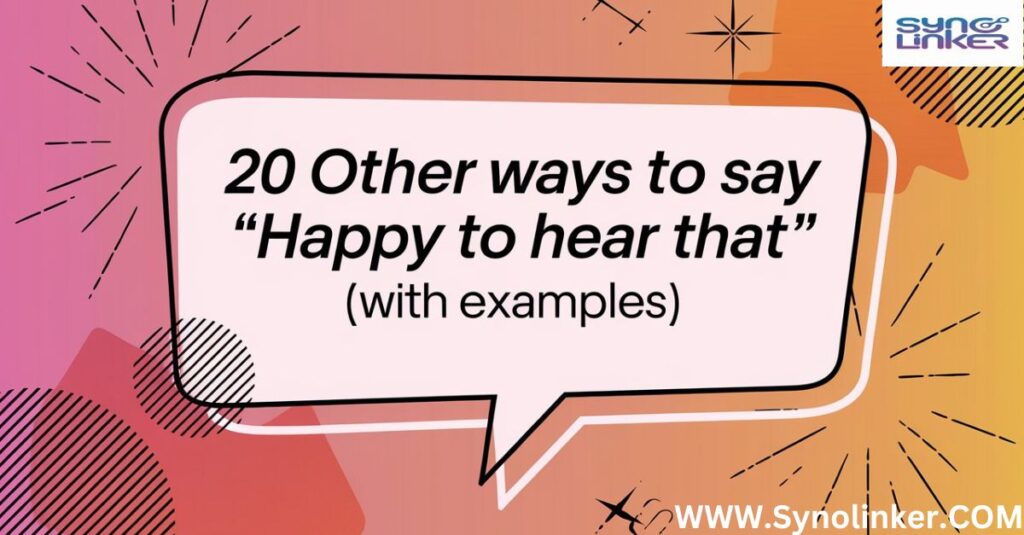We’ve all been there. Someone shares good news, and we instinctively respond with “Happy to hear that.” But let’s face it, this phrase can get stale faster than day-old bread. Why settle for the same old response when you can spice up your conversations with fresh alternatives? In this article, we’ll explore 20 other ways to say “happy to hear that” that’ll make your friends, colleagues, and loved ones feel truly appreciated.
Is it good to say “Happy to hear that”?
While this phrase is perfectly acceptable, it can become repetitive if overused. It’s a safe, neutral expression that conveys positivity, but it might lack the personal touch or enthusiasm that other alternatives offer. Varying your responses can make your interactions more engaging and sincere. However, in casual or quick exchanges, “happy to hear that” remains a reliable choice to express that you’re happy for someone.
Here Are 20 Other Ways To Say “Happy To Here That“
- That’s great to hear!
- I’m so glad to hear
- This makes me very happy
- What wonderful news!
- I’m thrilled to hear that
- You’ve made my day
- That’s such a relief
- I’m delighted that’s the case
- I’m so pleased to hear
- This is fantastic news
- This has brightened my day
- I’m over the moon to hear that
- What a fantastic turn of events
- I’m tickled pink
- This news puts a spring in my step
- I’m absolutely chuffed
- This calls for a celebration
- I’m doing a happy dance right now
- This has made my whole week
- I’m grinning from ear to ear
1. That’s Great to Hear!
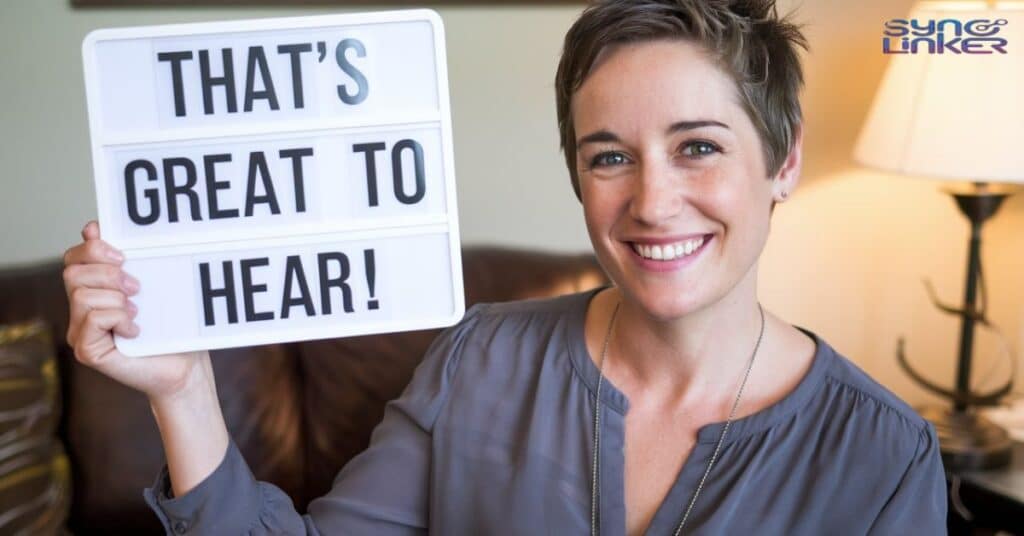
Sometimes, simplicity is key. “That’s great to hear” packs a punch without sounding overly formal. It’s perfect for both personal and professional settings.
Example scenario (Text message):
Friend: “I just got promoted at work!”
You: “That’s great to hear! You’ve been working so hard. Time to celebrate! 🎉”
Read more about 20 Other Ways to Say ” Happy Valentine’s Day”
2. I’m So Glad to Hear
When you want to express that you’re happy on a more personal level, try “I’m so glad to hear.” It conveys a deeper emotional connection.
Example scenario (Email):
Subject: Re: Baby News
From: Sarah
To: EmmaDear Emma,
I’m so glad to hear about your pregnancy! What a beautiful journey you’re about to embark on. If you need any advice or just want to chat, I’m here for you.
Warmest wishes,
Sarah
3. This Makes Me Very Happy
For times when you want to emphasize how the news affects you personally, “This makes me very happy” hits the spot. It shows that their joy is your joy too.
Example scenario (Face-to-face conversation):
Colleague: “Remember that project I’ve been struggling with? I finally cracked it!”
You: “Wow, this makes me very happy! I know how much this meant to you. Your perseverance really paid off.”
4. What Wonderful News!

When something truly extraordinary happens, “What wonderful news” captures that sense of excitement and surprise.
Example scenario (Social media comment):
Friend’s post: “We’re engaged! 💍”
Your comment: “What wonderful news! You two are perfect together. Can’t wait to see you both and hear all about the proposal!”
5. I’m Thrilled to Hear That
“I’m thrilled to hear that” takes your happiness up a notch. It’s perfect for expressing enthusiasm about major life events or significant achievements.
Example scenario (Voicemail):
“Hey Alex, it’s Jamie. I’m thrilled to hear that you got into your dream school! All those late nights studying really paid off. Give me a call when you can – we need to plan a proper celebration!”
Read more grammar lessons on Synolinker
6. You’ve Made My Day

Sometimes, someone else’s good news can brighten your whole day. “You’ve made my day” lets them know just how much their happiness means to you.
Example scenario (In-person conversation):
Friend: “I finally finished writing my novel!”
You: “You’ve made my day with this news! I remember when it was just an idea, and now look at you – a full-fledged author!”
7. That’s Such a Relief
Not all good news is about achievements. Sometimes, it’s about dodging bullets or overcoming challenges. “That’s such a relief” works perfectly in these situations.
Example scenario (Phone conversation):
Parent: “The doctor called. All my test results came back clear.”
You: “Oh, Mom, that’s such a relief! I’ve been so worried. Let’s plan a special dinner to celebrate your clean bill of health.”
8. I’m Delighted That’s the Case
For a more formal or professional setting, “I’m delighted that’s the case” strikes the right balance between enthusiasm and decorum.
Example scenario (Business email):
Subject: Re: Contract Approval
From: Mr. Johnson
To: Ms. PatelDear Ms. Patel,
I’m delighted that’s the case regarding the contract approval. Your team’s swift action has put us ahead of schedule. Looking forward to our continued collaboration.
Best regards,
Robert Johnson
9. I’m So Pleased to Hear
“I’m so pleased to hear” is another versatile phrase that works well in both casual and formal contexts. It conveys genuine happiness without going overboard.
Example scenario (Handwritten note):
Dear Professor Williams,I’m so pleased to hear about your recent publication. Your research continues to inspire and guide many of us in the field. Congratulations on this well-deserved recognition!
Warm regards,
Laura Chen
You might be interested in 20 Other Ways to Say “Happy Sabbath”
10. This Is Fantastic News
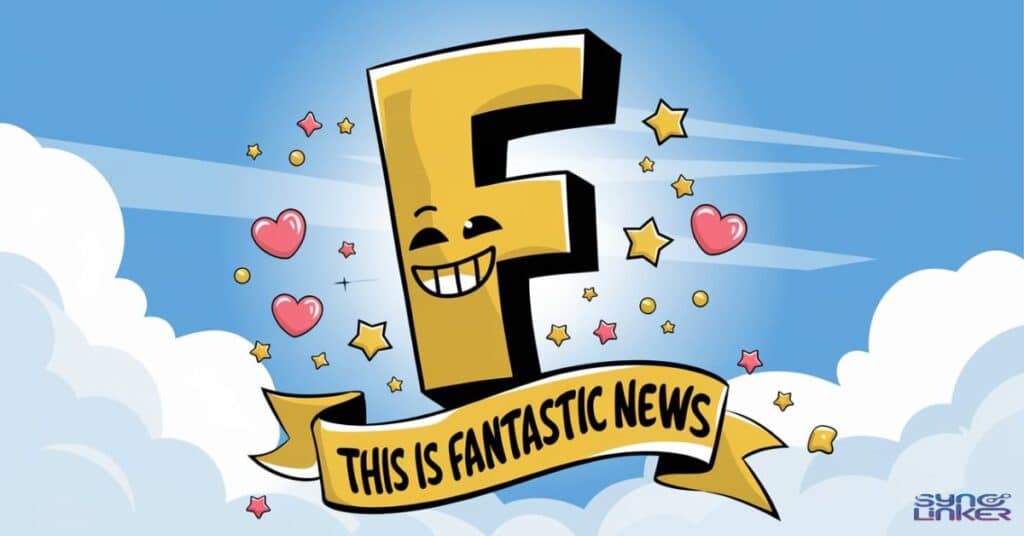
When you want to match someone’s excitement level, “This is fantastic news” does the trick. It’s enthusiastic without being over the top.
Example scenario (Group chat):
Jake: “Guys, I just landed my first client for my freelance business!”
You: “This is fantastic news, Jake! Your hard work is paying off. First of many to come, I’m sure! 🥳”
11. This Has Brightened My Day
When someone’s news lifts your spirits, let them know with this cheerful phrase.
Example scenario (Text message):
Friend: “I just adopted the cutest puppy!”
You: “This has brightened my day! Can’t wait to meet the little fur ball. When can I come over?”
12. I’m Over the Moon to Hear That
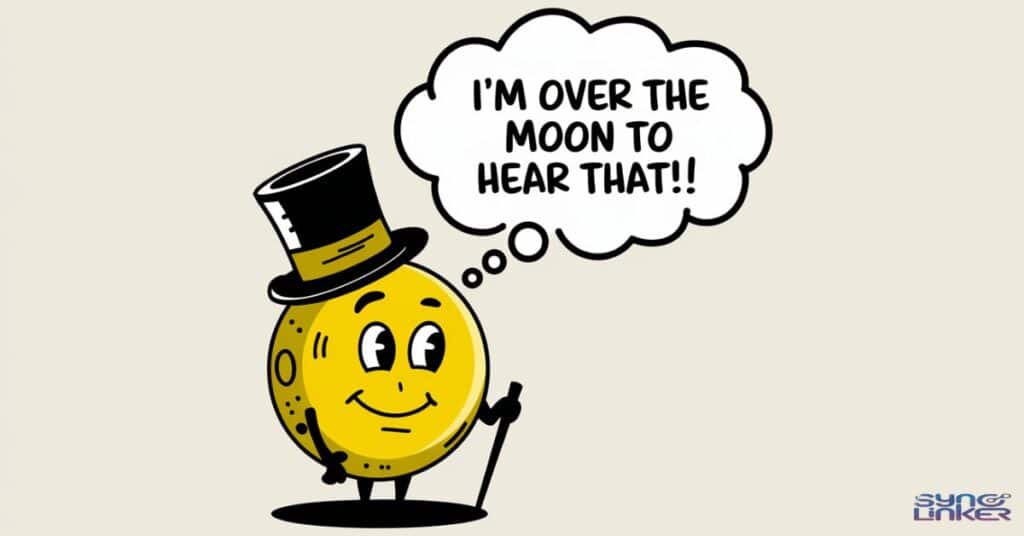
For truly exceptional news, this expression conveys a sense of elation and excitement.
Example scenario (Phone call):
Sister: “I’m pregnant with twins!”
You: “Oh my gosh, I’m over the moon to hear that! Twins! You’re going to be an amazing mom. How are you feeling?”
13. What a Fantastic Turn of Events
This phrase works well when good news comes after a period of uncertainty or difficulty.
Example scenario (Email):
Subject: Re: Job Update
From: Mark
To: LisaHi Lisa,
What a fantastic turn of events! I know you’ve been job hunting for months. This new position sounds perfect for your skills. Let’s catch up soon to celebrate your fresh start.
Best,
Mark
14. I’m Tickled Pink
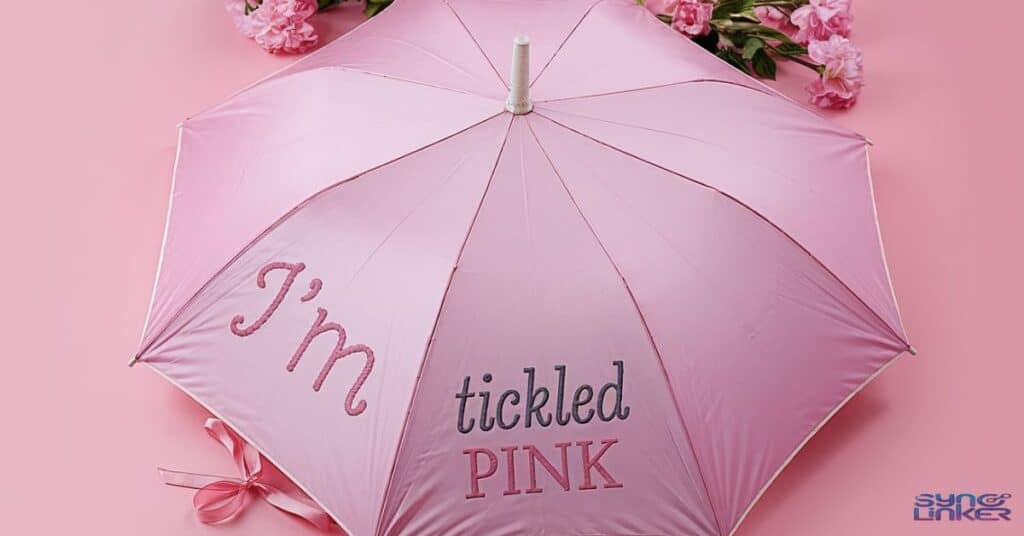
For a more playful and lighthearted response, especially with close friends or family.
Example scenario (In-person conversation):
Friend: “Remember that guy I’ve had a crush on? He just asked me out!”
You: “Get out! I’m tickled pink for you! We need to plan your outfit ASAP.”
15. This News Puts a Spring in My Step
Use this when someone’s good news energizes you or improves your mood.
Example scenario (Work chat):
Colleague: “Our team just landed the Johnson account!”
You: “This news puts a spring in my step! All those late nights were worth it. Great job, everyone!”
16. I’m Absolutely Chuffed
This British expression is perfect for showing enthusiasm in a charming, slightly quirky way.
Example scenario (Social media comment):
Friend’s post: “I just got my first book deal! 📚✍️”
Your comment: “I’m absolutely chuffed for you, mate! Your talent and hard work are finally getting the recognition they deserve. Can’t wait to see it on the shelves!”
17. This Calls for a Celebration
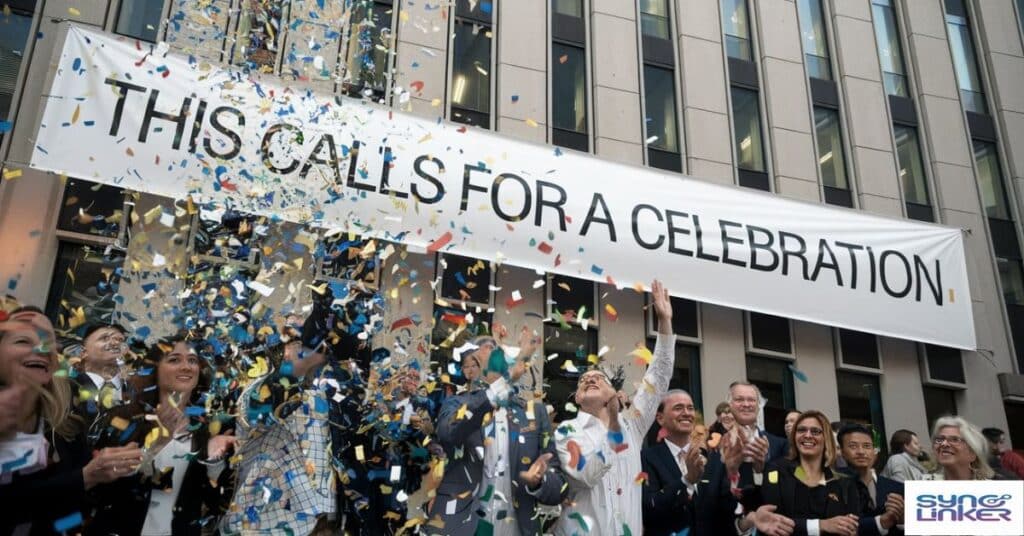
When you want to emphasize that the news is worth commemorating.
Example scenario (Group chat):
Friend: “I finally paid off all my student loans!”
You: “This calls for a celebration! You’ve worked so hard for this. Dinner’s on me this weekend – you choose the place!”
18. I’m Doing a Happy Dance Right Now
A fun, vivid way to express your joy, especially in written communication.
Example scenario (Text message):
Friend: “I just got two front-row tickets to the sold-out concert!”
You: “No way! I’m doing a happy dance right now! 💃 You’re the best friend ever!”
19. This Has Made My Whole Week
For when the good news is significant enough to impact your mood long-term.
Example scenario (Email):
Subject: Re: Family Reunion Plans
From: Uncle Tom
To: SarahDear Sarah,
This has made my whole week! I’m so excited that you’re organizing a family reunion. It’s been far too long since we’ve all been together. Count me in, and let me know how I can help with the planning.
Love,
Uncle Tom
20. I’m Grinning from Ear to Ear
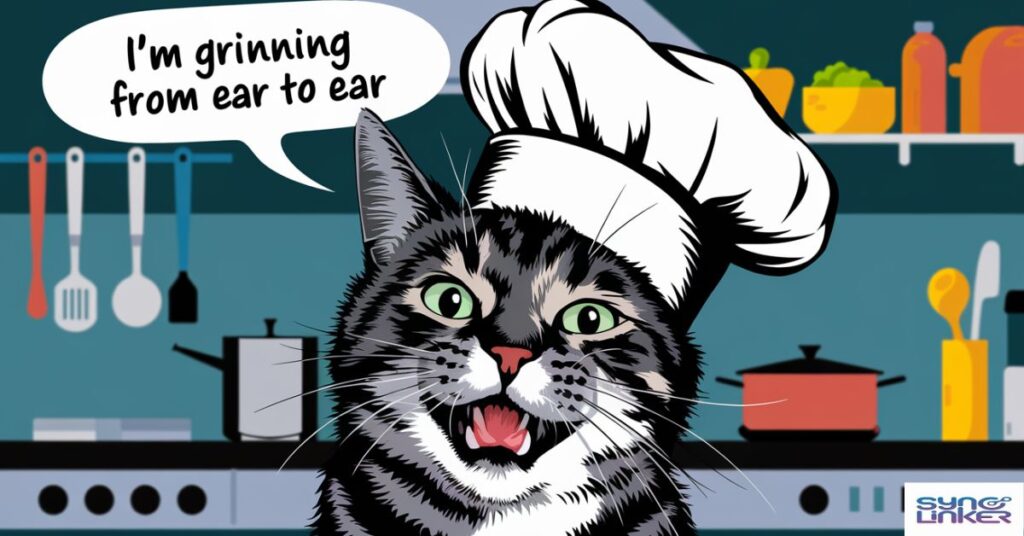
This vivid expression paints a picture of your happiness.
Example scenario (Voice message):
“Hey Alex, it’s Jamie. I just heard about your promotion. I’m grinning from ear to ear! You’ve worked so hard for this. Let’s grab a drink soon so you can tell me all about your new role!”
Why It Matters: The Art of Expressing Joy
Learning other ways to say “happy to hear that” isn’t just about variety – it’s about effective communication. When we take the time to craft thoughtful responses, we show joy in a way that strengthens our relationships and makes others feel truly heard and appreciated.
Think about it. How would you feel if every time you shared good news, you got the same robotic “happy to hear that” in response? It might start to feel a bit… well, unhappy. By expanding your vocabulary and tailoring your responses, you convey happiness in a more genuine, impactful way.
Moreover, these alternatives allow you to express that you’re happy with nuance. Sometimes you’re relieved, other times you’re thrilled, and occasionally, you’re downright ecstatic. Having a range of phrases at your disposal lets you match your response to the situation’s emotional tone.
Putting It Into Practice
Ready to shake up your conversation game? Here are some tips to help you incorporate these new phrases:
- Listen actively: Really tune in to what the person is saying. This will help you choose the most appropriate response.
- Match the energy: If someone’s quietly pleased about something, “That’s such a relief” might work better than “This is fantastic news!”
- Be genuine: Don’t just parrot phrases. Choose words that truly reflect how you feel.
- Follow up: After your initial response, ask questions or offer support to show you’re genuinely interested.
- Practice: Like any skill, using new phrases might feel awkward at first. The more you use them, the more natural they’ll become.
Remember, the goal isn’t to completely eliminate “happy to hear that” from your vocabulary. It’s a perfectly fine phrase in many situations. The aim is to expand your repertoire so you can communicate happiness more effectively and make your conversations more engaging.
Wrapping Up: The Joy of Joyful Communication
In a world where digital communication often lacks the warmth of face-to-face interactions, taking the time to express that you’re happy in varied and thoughtful ways can make a real difference. It’s not just about the words – it’s about the emotional connection and personal joy we share with others.
So the next time someone shares good news with you, pause for a moment. Think about how their news makes you feel. Are you relieved? Thrilled? Has it brightened your day? Choose your words accordingly, and watch as your relationships deepen and your conversations become richer.
After all, sharing joy is one of life’s greatest pleasures. Why not do it with style and sincerity? Your friends, family, and colleagues will appreciate the effort, and you might just find that expressing happiness in new ways brings you more joy too. Now that’s something to be happy about!

Emily Hanis is an experienced writer with a passion for all things grammar. With years of expertise in the field, she brings clarity and creativity to her content, making complex language rules easy to understand. On her blog, Emily shares practical tips, grammar insights, and a rich collection of synonyms to help readers enhance their writing skills. Her engaging style makes learning grammar both informative and fun.

